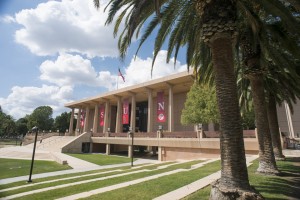CSUN to Host Workshop on Developing Strategies for Dealing with Climate Change

The inaugural meeting of the UC-CSU Knowledge Action Network for Transformative Climate and Sustainability Education and Action will take place at CSUN on March 27-28. Photo by Lee Choo.
Hoping to tap into the brain power of the California State University and University of California systems and the creative imaginations of members of the community, California State University, Northridge will host a two-day workshop later this month to explore new ways to tackle the issues raised by climate change.
The inaugural meeting of the UC-CSU Knowledge Action Network for Transformative Climate and Sustainability Education and Action will take place on March 27-28 in CSUN’s Jerome Richfield Hall, Room 153, located on the west side of the campus at 18111 Nordhoff St. in Northridge.
“The goal is for us to come up with concrete strategies that we can carry out at local campuses — including local elementary, middle and high school campuses — and can be disseminated in the community,” said Chicana and Chicano studies assistant professor Stevie Ruiz, one of the meeting’s coordinators. “We are bringing together faculty who are committed to climate resilience with members of the community who are on the ground doing a lot of the work that makes a difference in our neighborhoods.”
The Knowledge Action Network is a collaborative effort by UC and CSU educators to scale and intensify California students’ literacy in climate change, climate justice, carbon neutrality/greenhouse gas emissions reductions and sustainability. Both systems have placed an emphasis on sustainability education, community-engaged scholarship and carbon neutrality in recent years. Organizers of the network said they want to merge those efforts for the mutual advantage of California students.
Among those taking part in the inaugural meeting will be faculty from Cal State Los Angeles and UC Santa Barbara, as well as CSUN. Ruiz said members of the community, including Parent Pioneers and Pacoima Beautiful, also have been invited to attend.
“The UC-CSU Knowledge Action Network is committed to a sustainable future and democratizing the dialogue about environmental justice to include low-income and historically disenfranchised populations,” he said. “We view the inclusion of diversity communities as necessary to generating solutions toward a more resilient future.”
Ruiz said participants will spend the two days networking and strategizing about realistic approaches to encourage environmental resilience.
“What’s really exciting about this workshop is that the participants aren’t just the science people,” said CSUN religious studies professor Amanda Baugh, whose research focuses on environmentalism and the religious community. “A lot of the participants are from the humanities. It’s a recognition that concern about the environment isn’t limited to certain fields. It’s an issue that affects us all, and we all need to be part of the dialogue about how to preserve it.”
For more information about the workshop, contact CSUN’s Department of Chicana and Chicano Studies at (818) 677-7355.

 experience
experience